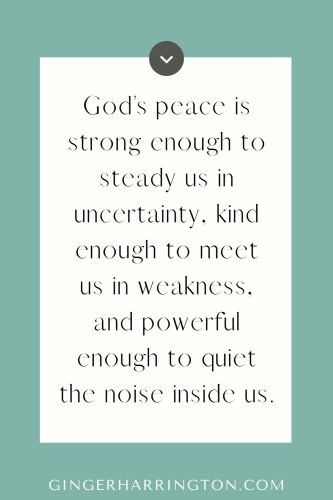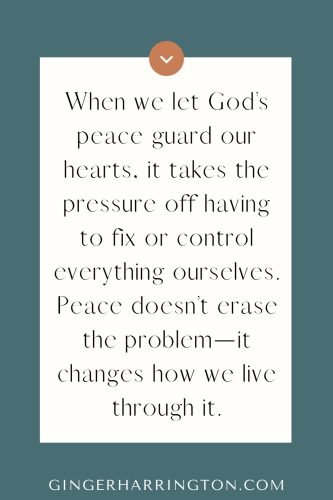Discover how the peace of God that surpasses understanding can guard your heart and mind in Christ Jesus. Learn practical ways to pray, surrender, and live protected by His peace every day.
Have you ever prayed your heart out and still felt anxious?
You did everything right—brought your worry to God, prayed for help, even said thank you in faith—and yet your mind still races and your heart feels raw.
If that sounds familiar, Philippians 4:7 offers hope that doesn’t depend on feelings or outcomes.
This post is part three of the Steady Heart Series, a journey through Philippians 4 discovering how faith steadies our emotions and anchors our peace in God’s presence.
The peace of God that surpasses understanding is more than relief from anxiety—it’s a protective presence that guards your heart and mind. In this study, we’ll unpack what that means and how to live in it one choice at a time.
“And the peace of God, which surpasses all understanding, will guard your hearts and your minds in Christ Jesus.” — Philippians 4:7
What does Philippians 4:7 really mean?
Paul wrote these words from a prison cell. Despite his circumstances, his letter radiates joy, steadiness, and deep peace.
In context, verse 7 follows the command in verse 6:
“Do not be anxious about anything, but in everything by prayer and supplication with thanksgiving let your requests be made known to God.”
Peace is not random—it’s the result of prayerful trust.
When we resist anxiety, pray about everything, and thank God in advance, peace follows like a faithful guard taking his post.
Peace isn’t the absence of problems—it’s the presence of God protecting your inner life.

Why does Paul say peace will “guard” your heart and mind?
The Greek word phroureō means “to stand guard, to protect by a military sentinel.”
For those of us who’ve lived military life, the imagery is vivid: a soldier on duty, alert, unwavering. That’s how God’s peace works—it’s active, not passive.
Peace is not weak or sentimental. It’s strong, steadfast, and protective.
It shields your emotions (“heart”) and your thoughts (“mind”) when worry wants to take over.
What kind of peace is Paul describing?
This peace is not fragile or fleeting. It’s not a momentary calm that fades when life feels uncertain.
It’s the steady, unshakable presence of God guarding your inner life like a soldier on duty—alert, protective, and faithful.
As a Marine spouse, the word guard catches my attention. I’ve watched my husband and countless others stand post, shoulder the weight of vigilance, and protect what matters most.
There’s discipline, strength, and endurance in that image. So when Paul says God’s peace will guard your heart and mind, —it’s a picture of active defense.
God’s peace doesn’t just soothe you; it stands watch over you.
Paul isn’t describing a surface-level calm or a temporary relief. He’s pointing to a supernatural peace that holds firm under pressure. It’s not dependent on circumstances or explanations—it’s anchored in the very presence of Christ.
This peace doesn’t need everything to make sense first. It doesn’t wait for answers or resolution. It simply rests in knowing that the Lord is near (Philippians 4:5).
When Paul says that this peace surpasses all understanding, I think he means it doesn’t play by our rules—it’s not limited to what we can explain or see.
God’s peace is strong enough to steady us in uncertainty, kind enough to meet us in weakness, and powerful enough to quiet the noise inside us.
When we let it guard our hearts, it takes the pressure off having to fix or control everything ourselves. Peace doesn’t erase the problem—it changes how we live through it.
Habit of Hope
This promise isn’t meant to stay theoretical—it’s something we can practice in real time. Here’s today’s Habit of Hope to help you apply it when worry starts to rise.
Steady your heart by receiving God’s peace. When anxiety rises, whisper this prayer: “I believe Your peace is here, Lord. Guard my heart with Your peace.”
Peace isn’t passive—it’s a gift you receive and a presence you rely on.

How is God’s peace different from human peace?
Human peace depends on control—on fixing, solving, or understanding.
But God’s peace surpasses understanding. It’s supernatural, not logical.
It shows up before resolution, not after it.
Co-host Larissa shared a story from her time ministering in a women’s correctional facility on Oahu—a place that made no sense for her to serve, yet God called her there. Despite weekly obstacles and spiritual warfare, she experienced deep, protective peace. It didn’t add up, but it held her steady.
- When have you felt God’s peace even though your situation didn’t change?
- How does trusting His presence free you from needing all the answers?
Why Do We Struggle to Trust God’s Kind of Peace?
If we’re honest, most of us equate peace with control.
We want the ability to fix things, stop the pain, or at least understand why something happened. Our human version of peace is tied to certainty—knowing how things will turn out. But that’s not the kind of peace Philippians 4:7 describes.
When we can’t change what happened, we often look for explanations to make sense of it all.
We think, “If I can just understand this, I’ll finally feel peaceful.” But God’s peace doesn’t hinge on explanations—it rests in relationship.
In my human understanding, I equate peace with having the situation solved. But God’s peace is different—it shows up in the middle of the stress and trusts Him anyway.
God’s peace doesn’t come from control—it comes from surrender.
It’s His presence in us, with us, and around us. It’s the assurance that even when we can’t see or explain what He’s doing, we can trust His character.
He is who He says He is, and He will do what He says He will do.
And that’s what makes it so powerful.
- What situations tempt you to seek control instead of trusting God?
- How might surrender open the door for peace to guard your heart?
A Real-Life Lesson from Philippians 4:6–7
Some mornings, peace feels like a distant friend.
Today was one of those mornings.
I woke up feeling heavy—discouraged, weighed down by things that hadn’t gone the way I hoped. I tried to process it with the Lord, to sort through what I was feeling and why.
But instead of feeling lighter, I just dug myself a little deeper into discouragement. My thoughts circled, my emotions tangled, and I finally said, “Lord, why is this happening? I’m trying to work through it with You.”
That’s when He gently brought Philippians 4:6–7 to mind:
“Do not be anxious about anything, but in everything by prayer and supplication with thanksgiving let your requests be made known to God. And the peace of God, which surpasses all understanding, will guard your hearts and your minds in Christ Jesus.”
I realized I had been trying to fix my feelings instead of praying through them.
So right there, I decided to do exactly what the verse says:
- I prayed about it instead of wallowing in it.
- I started thanking Him for small blessings in the middle of the discouragement.
- I chose to trust that He was at work, even if I couldn’t see how.
- And I made a conscious choice to receive His peace—not earn it, not force it, just receive it.
It wasn’t instant peace.
There was no sudden rush of relief, no emotional switch that flipped everything to calm. But as I went about my day, something began to shift. The heaviness didn’t vanish all at once—it lifted gradually, like fog thinning as the sun rises.
Nothing about my circumstances changed.
But my perspective did.
That’s the beauty of Philippians 4:7—it’s peace that guards rather than peace that fixes. It settles our hearts even when nothing around us has settled yet.
And that’s what I want to remind you (and myself):
- Peace often takes time to take hold.
- It’s not always an immediate calm—it’s a process of trust.
- This isn’t a one-time, “wow, I experienced God’s peace once” kind of story.
It’s a pattern we can return to again and again. - We want to experience God’s peace not just once, but in every stressful situation, every anxious morning, every heavy day.
- That’s why we always have to keep verse 7 connected to verse 6—because the peace that guards comes after the prayer that surrenders.
So when peace feels far away, remember: you don’t have to create it. You simply practice the process—pray, thank, trust, and receive.
And even if it takes a little time, that quiet steadiness will come because peace is a process as much as a promise.
When you resist worry, pray with gratitude, and release control, you make space for peace to do its protective work.

A Simple Checklist for a Peace Reset:
- Have I paused to resist worry?
- Have I prayed about this, not just complained?
- Have I thanked God for being near?
If not, start there. The promise follows the process.
How can Christians experience this peace in daily stress?
This peace isn’t produced by discipline or mindset hacks—it’s the fruit of surrender and relationship.
Galatians 5:22 reminds us that peace is a fruit of the Spirit, not a product of understanding. We don’t create it; we receive it as we yield to the Holy Spirit working in us.
Practice these simple peace rhythms:
The beauty of God’s peace is that it’s both a promise and a practice. We can’t manufacture it, but we can make space for it. These simple peace rhythms help us do just that—turning truth into daily habit.
- Pray before you react.
Whisper, “Jesus, let Your peace stand guard over my thoughts right now.” - Speak peace by faith.
Say aloud, “I trust God’s peace is guarding me in this moment.” - Personalize Philippians 4:7.
Write or pray it in your own words. Example:
“God’s peace frees me from oppressive thoughts and protects my heart and mind as I walk with Christ.” - Memorize Philippians 4:6–7.
Let the Holy Spirit bring it to mind when anxiety flares. - Visualize Jesus standing guard.
Picture Him calm and steady at the door of your heart, protecting what you cannot control.
Which one of these peace rhythms do you sense God inviting you to practice today?
Remember, learning to live in peace is a journey—it grows one choice, one prayer, one moment of surrender at a time. Friend, you don’t have to have everything figured out to live with a steady heart. Let God’s peace do what only He can—guard your heart, calm your mind, and remind you that He’s near.
FAQ
What does Philippians 4:7 mean by “peace guarding your heart”?
It means God’s presence acts as a spiritual protector over your emotions and thoughts—keeping fear and chaos from ruling your inner life.
How can I experience peace that surpasses understanding?
Through prayer, gratitude, and surrender. When you shift from control to trust, you receive peace as a gift of the Holy Spirit.
Why does peace sometimes fade after prayer?
Because our minds wander back to worry. Keep re-centering through thanksgiving and truth—peace grows through practice, not perfection.
The Steady Heart Series
-
- Part 1:How to Choose Joy in Hard Times: A Study of Philippians 4:4-5
- Part 2: How to Shift from Anxiety to Peace: A Study of Philippians 4:6
- Part 3: How to Find God’s Peace That Guards Your Heart: A Study of Philippians 4:7
- Part 4: How to Filter Your Thoughts and Find Peace: A Study of Philippians 4:8-9
About Ginger Harrington
Ginger Harrington is an author, speaker, and founder of the Habits of Hope Podcast and The Deeper Life Collection.
A military wife and mom, she writes about spiritual growth and emotional well-being at GingerHarrington.com, helping women cultivate hope and a deeper life with Christ for heart and home.
This post is for encouragement and inspirational purposes only. It reflects biblical insights and personal experiences related to faith and anxiety. It is not intended to diagnose, treat, or replace professional medical or mental health care. If you are struggling with anxiety or other mental health concerns, please seek support from a qualified counselor, physician, or mental health professional.

 So glad you're here. I help busy women—gals like you— build healthy habits for living well with biblical wisdom and practical steps to deepen your faith, increase your hope, and thrive in your purpose.
So glad you're here. I help busy women—gals like you— build healthy habits for living well with biblical wisdom and practical steps to deepen your faith, increase your hope, and thrive in your purpose.




Wow, this was so amazing 👏 thank you.
Hi Ashley, I’m so glad you found this content helpful! I know you will enjoy the other articles/episodes in this series as well. This has been an area of struggle and growth for me and it’s a joy to be able to share what God has taught me through the years. I truly hope this is a game-changer for you! Thanks so much for sharing your response to the content today! Blessings to you!
this was really powerful
Hi Ennie,
I am praying that God’s peace will be a steady and constant part of your daily experience. Blessings to you!
It was very powerfull. I felt so emotional
Hi Ennie,
Thanks so much for sharing the impact this post had on you. I felt the same way as the Holy Spirit gave me fresh understanding and application for this passage. I love how God can make a verse you have read and studied speak to your current situation. Blessings, dear one!